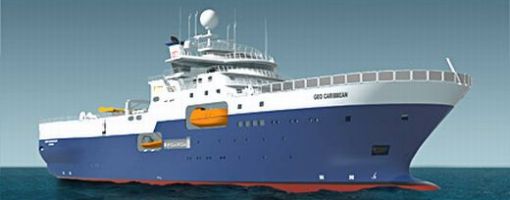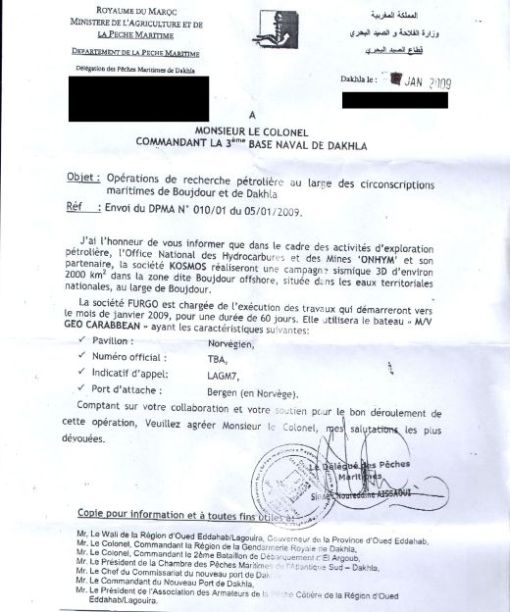
The Moroccan Navy was asked to support Fugro-Geoteams oil assignment outside occupied Western Sahara. This is shown by an internal Moroccan government document that Norwatch has obtained. Norwatch, 17 March 2009.
By Erik Hagen
Norwatch
17 March 2009
Fugro-Geoteam's assignment in occupied Western Sahara is in all probability about to be concluded. The controversial assignment, which is being carried out for Moroccan authorities, was started at the beginning of January. If Morocco discovers the oil they are looking for, it is not very likely that Morocco will ever permit the Sahrawi people to go through with the referendum on the country's future, as Morocco and the UN have previously promised.
Norwatch exposed the controversial assignment during the start-up at the beginning of January.
The Norwegian sailing was originally supposed to last 2 months but is now entering the 3rd month. The reason for the deferment could be technical problems on Fugro-Geoteam's newly constructed seismic vessel.
In any case, there can not be much time left of the assignment. And as it approaches its end, Norwatch has obtained more information on the conditions for the project.
An internal document between the Moroccan Ministry of Fisheries and the Navy shows that the Navy in the coast city of Dakhla was asked to ensure that the Norwegian companys operation would be carried out without problems.
“We count on your collaboration and assistance to make this operation successful,” it says in the letter sent to the colonel at the Navy base in Dakhla at the beginning of January this year.
The document refers to the name of the Norwegian company and a number of features of the vessel to be used in the occupied areas. Reference to the vessel sailing under Norwegian flag is not correct; the ship has since December sailed under a Caribbean flag. See the document below.
But there are other interesting facts in the document. Among other things it reveals the kind of seismic being carried out by the Norwegian company - that is, so-called 3D. In addition, it mentions the size of the area is to be explored: “an area of about 2000 sq. km. in the so-called Boujdour offshore block”.
This implies that Fugro-Geoteam's employer, the privately owned oil company Kosmos Energy, has gotten a clearer idea as to where in the occupied country the oil may be found. Kosmos Energy's huge block off Western Sahara is all of 43,998 sq. km. Fugro-Geoteam is now surveying a small twentieth part of the block.
The document says furthermore that the exploration is to start in January and last 60 days. The activities have been met by protests from the Sahrawis. The accompanying video shows Sahrawi demonstrations against Fugro-Geoteam both at the University in Agadir and at a small town in south Morocco.
Article continues beneath video.
Problems
But Fugro-Geoteam has met problems in carrying out the assignment within the planned 60 days.
As early as 11 February the harbour register in Las Palmas showed that Geo Caribbean was there for reparations. The ship was in port for a short 15 hours before leaving. In addition, they have now gone far beyond the time span originally planned for the assignment.
Today Geo Caribbean's Faroese escort ship, Thor Omega, is on its way back to Las Palmas. For some unknown reason, Thor Omega has during the past 24 hours sailed together with another ship, Island Senior.
Island Senior previously was a Thor Offshore vessel sailing under the name Thor Fish and was last year sold by Thor Offshore to a company on the Shetland Islands, Island Innovations Ltd. Thor Fish is still referred to on Thor Offshore's web pages as if it were a part of its fleet.
The manager of Thor Offshore, Hans Andrias Joensen, told Norwatch yesterday that he does not wish to either confirm or deny that Island Senior has worked as a part of Fugro-Geoteam's assignment.

NY Check new Western Sahara poster!
“Try to Visit Western Sahara”…
The Security Council fails Western Sahara and international law
On 31 October 2025, a new resolution was adopted in the UN Security Council calling on the Saharawis to negotiate a solution that would entail their incorporation into the occupying power, Morocco.
Saharawis Demonstrate Against Trump Proposal
The United States has proposed in a meeting of the UN Security Council on Thursday that the occupied Western Sahara be incorporated into Morocco.
Skretting Turkey misled about sustainability
Dutch-Norwegian fish feed giant admits using conflict fishmeal from occupied Western Sahara. Last month, it removed a fake sustainability claim from its website.



